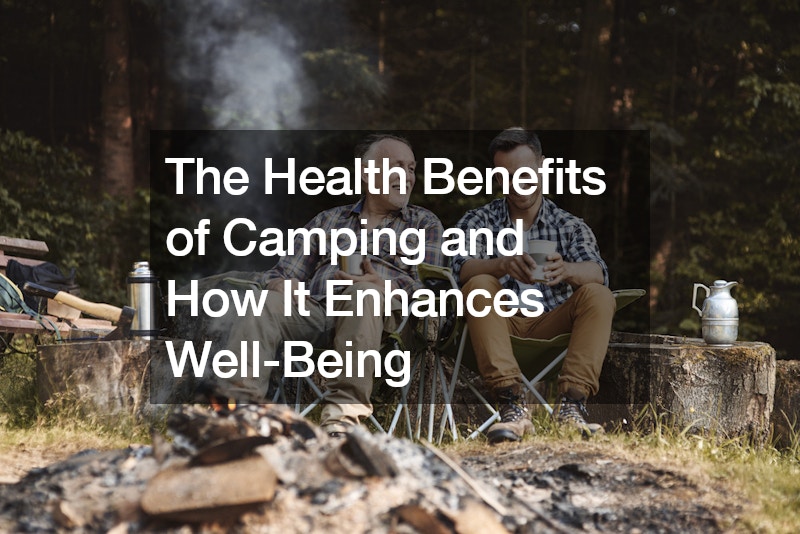Camping is a cherished pastime for many, offering an escape from the hustle and bustle of everyday life. Beyond its recreational appeal, camping provides a plethora of health benefits that contribute to overall well-being. Whether you’re pitching a tent in a remote forest or enjoying the comforts of a rooftop camper, the positive impacts on your physical and mental health are significant and wide-ranging.
Breathing Fresh Air
One of the most immediate benefits of camping is the fresh air you breathe. Spending time near trees and greenery increases your intake of oxygen, which has a direct impact on your body and mind.
Increased oxygen levels boost the release of serotonin, a neurotransmitter that promotes a sense of well-being and happiness. This natural environment helps to reduce stress and anxiety, providing a calming effect that can be hard to find in urban settings.
Absorbing Sunshine
Camping also means spending more time outdoors, which leads to greater exposure to sunlight. Sunlight is a natural source of vitamin D, an essential nutrient that helps maintain normal levels of phosphate and calcium in the blood. This is crucial for bone health, as vitamin D aids in the absorption of these minerals, keeping your bones strong and healthy. Unlike the limited sunlight you might get through windows at home or in the office, camping allows for prolonged periods of direct sunlight exposure, enhancing your body’s vitamin D levels.
Engaging in Physical Activity
Camping inherently involves physical activity. Whether you’re hiking to your campsite, setting up your tent, or exploring the surrounding nature, these activities require physical exertion. Hiking, for instance, is an excellent form of cardiovascular exercise, which benefits your heart and lungs. This type of exercise improves cardiovascular health, increases stamina, and can even help in weight management. The varied terrain you encounter while camping also engages different muscle groups, providing a full-body workout without the need for a gym.
Improving Sleep Quality
Many campers report that they sleep better outdoors than they do at home. This can be attributed to the physical exhaustion from a day full of outdoor activities. After spending the day hiking, swimming, or simply exploring, your body naturally feels more tired and ready for rest. Falling asleep in a tent, away from the artificial lights and electronic distractions of modern life, can help reset your internal body clock. The natural light-dark cycle you experience while camping helps regulate your circadian rhythm, leading to improved sleep patterns and a more restful night’s sleep.
Disconnecting from Technology
In today’s digital age, many of us are glued to our electronic devices, which can serve as significant distractions. Camping provides a unique opportunity to unplug from technology and reconnect with nature. Leaving your devices behind allows you to engage fully with your surroundings and the people you are with. This break from constant digital stimulation can reduce stress, improve mood, and enhance mental clarity. Rooftop campers, who often camp in more urban environments, can especially benefit from this digital detox, finding peace and tranquility amid their busy lives.
Reconnecting with Nature
Camping offers a chance to reconnect with the natural world. This reconnection can be incredibly therapeutic, providing a sense of peace and perspective that is often missing in daily life. The sights, sounds, and smells of nature can be soothing and invigorating, reminding us of the beauty and simplicity of the natural world. Rooftop campers, even when parked in cityscapes, can enjoy the stars, fresh air, and a different view, making their urban escape feel like a true retreat into nature.
Enhancing Mental Health
The mental health benefits of camping are profound. The combination of physical activity, fresh air, and the absence of digital distractions contributes to a significant reduction in stress levels. The natural environment promotes relaxation and mindfulness, allowing you to focus on the present moment. This can lead to improved mental clarity, increased creativity, and a greater sense of well-being. For those struggling with mental health issues, camping can offer a respite from the pressures of everyday life and provide a space for reflection and healing.
Building Stronger Relationships
Camping is often a social activity, whether you are with family, friends, or fellow outdoor enthusiasts. Sharing experiences in nature can strengthen bonds and create lasting memories. The collaborative efforts involved in setting up camp, preparing meals, and exploring together foster teamwork and communication. These shared experiences can enhance your social connections and improve your overall sense of happiness and belonging.
Conclusion
In summary, camping offers numerous health benefits that enhance physical and mental well-being. From breathing fresh air and absorbing sunlight to engaging in physical activity and improving sleep quality, the advantages are plentiful. Disconnecting from technology and reconnecting with nature provides a much-needed break from the stresses of modern life. Whether you are an avid camper or a rooftop camper seeking a quick urban escape, taking the time to immerse yourself in the great outdoors can have lasting positive effects on your health and happiness. So pack your gear, leave your devices behind, and embrace the transformative power of camping for a healthier, more balanced life.
.


